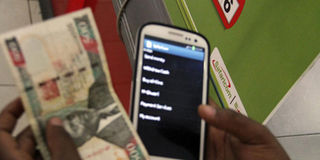Mobile deals hit new high despite Rotich July tax rise

Mobile money has become a key pillar of Kenya’s economy. FILE PHOTO | NMG
What you need to know:
- Sh332.35 billion deals were settled via phones in July, only lower than last March’s Sh337.11 billion and December 2017’s Sh332.62 billion.
- Treasury secretary Henry Rotich increased excise duty on mobile money transfers to 12 per cent from 10 per cent.
- Mobile money has become a key pillar of Kenya’s economy, with last year’s transactions valued at Sh3.4 trillion representing 46.95 per cent of Kenya’s national wealth — gross domestic product (GDP) — which stood at Sh7.75 trillion last December.
Mobile payments hit a monthly high in July, defying the rise in transactional tax.
Fresh data from the Central Bank of Kenya (CBK) show Sh332.35 billion deals were settled via phones during the month, only lower than last March’s Sh337.11 billion and December 2017’s Sh332.62 billion.
Treasury secretary Henry Rotich increased excise duty on mobile money transfers to 12 per cent from 10 per cent.
Mr Rotich’s move to invoke Provisional Collection of Taxes and Duties Act to enforce the increment in taxation from July 1 before the Finance Bill 2018 was enacted by the National Assembly was temporarily suspended by the courts on July 19.
The High Court consequently determined last week the move was illegal even as President Uhuru Kenyatta signed into law the Finance Act last Friday, raising the duty on mobile transactions by two percentage points.
The increased duty is part of the cash Mr Rotich is targeting to fund a plan to give every Kenyan a medical cover to access healthcare services by 2022.
The universal healthcare plan will also be funded through the projected Sh20.2 billion from doubling of duty on bank cash transfers to 20 per cent and the increase to 15 per cent on phone calls and Internet use from previous 10 per cent.
Mobile money has become a key pillar of Kenya’s economy, with last year’s transactions valued at Sh3.4 trillion representing 46.95 per cent of Kenya’s national wealth — gross domestic product (GDP) — which stood at Sh7.75 trillion last December.
Key sectors of the economy such as financial services, retail and wholesale trade, agriculture and health are increasingly integrating mobile payments into their operations.




